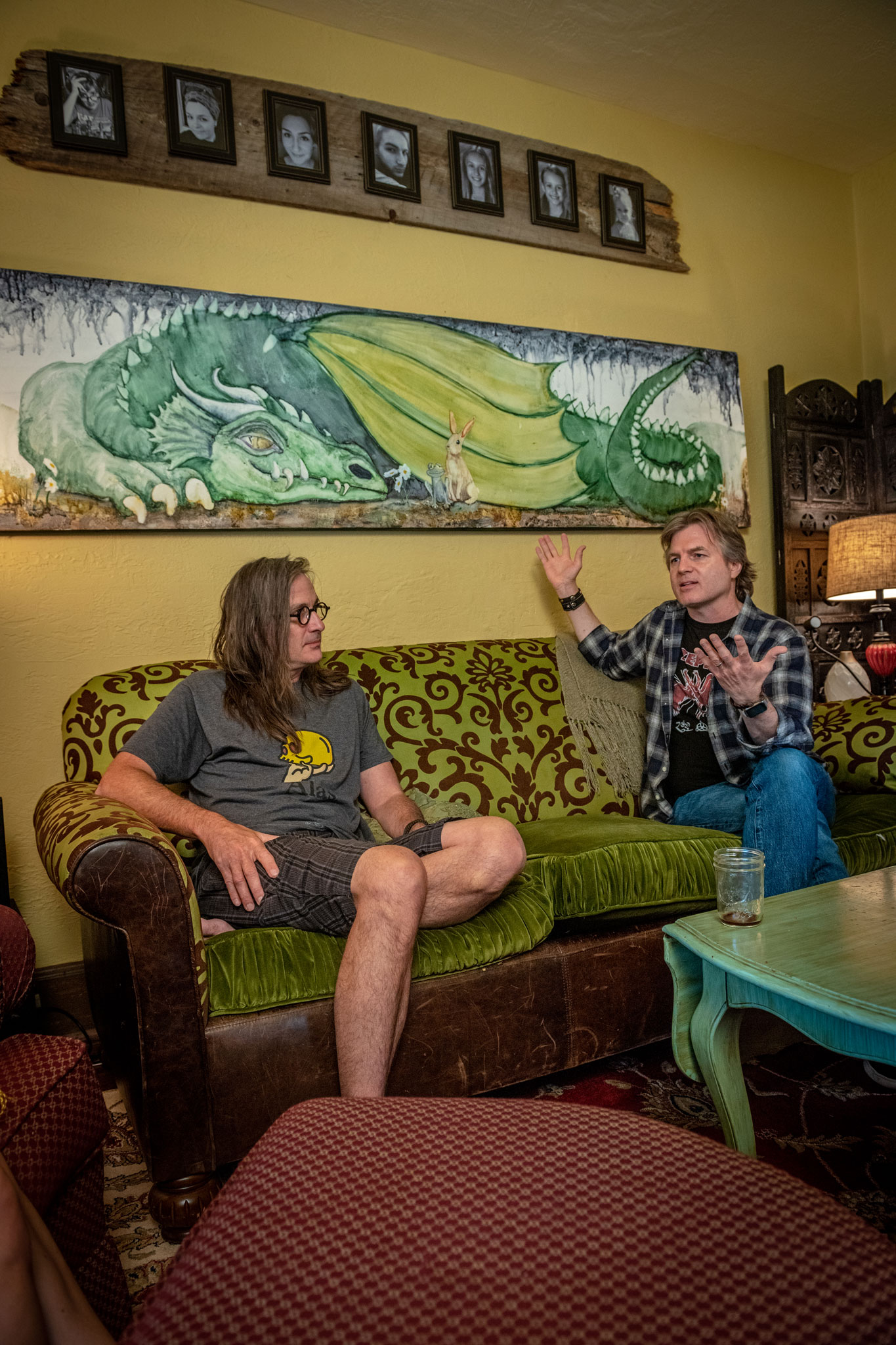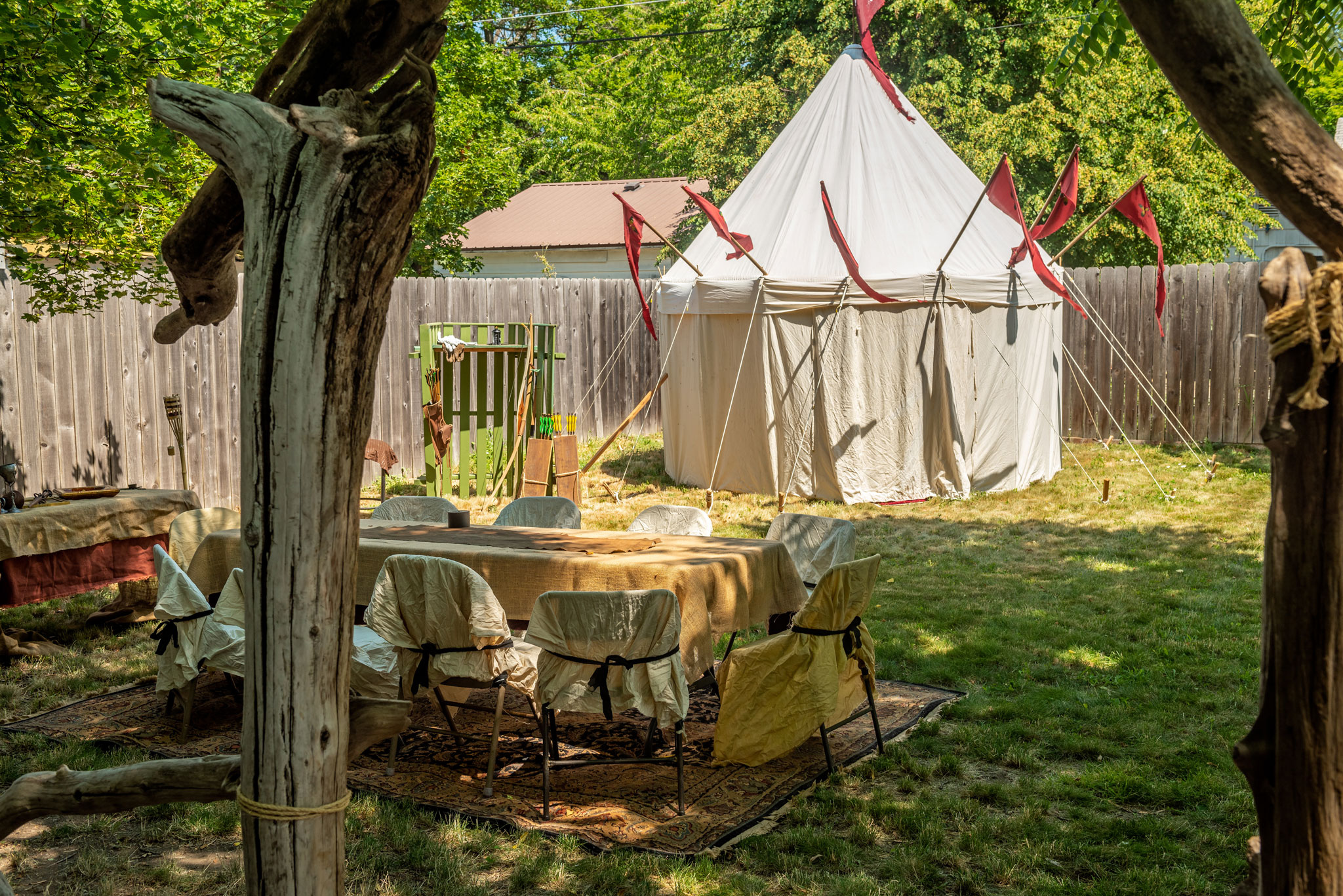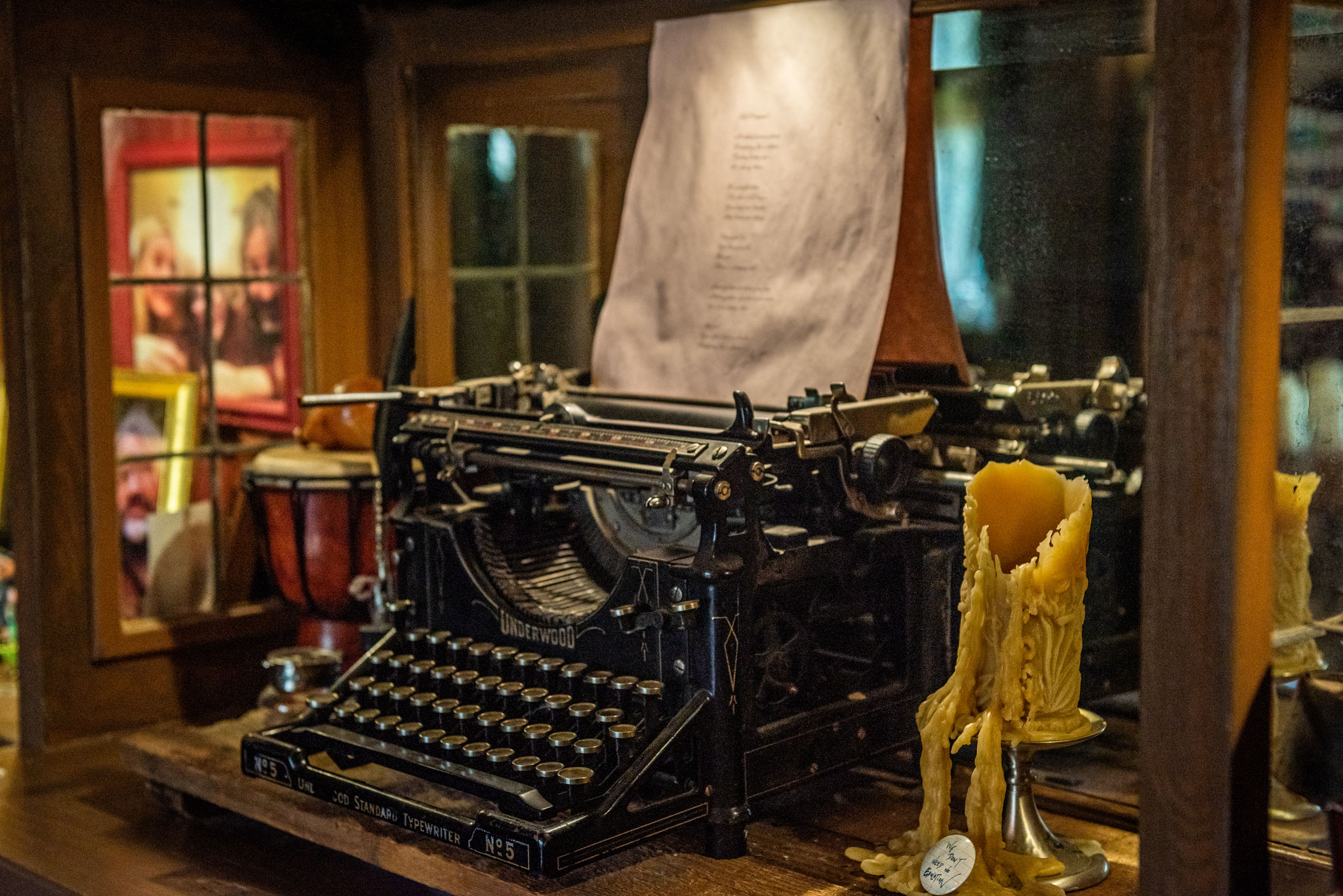It was a glorious mid-summer day, aglow with golden sunshine sifting through verdant, swaying leaves. I pulled up to the home of local author Michael Koep, nestled amidst the houses of one of Coeur d’Alene’s older neighborhoods, and was instantly intrigued. His residence stood out with its unique fence of gnarled driftwood posts, and the entrance to his modest yard guarded by a circular, cherry-red gate.
As I approached, I recognized the elegant shape on the gate as that of a slender dragon grasping a flower. With every step toward the front door, I was impressed with a sense of approaching a portal into a different era. Who was this man, whose residence emanated such Renaissance taste?
The front door opened, and I found myself face-to-face with the master of the house. I half expected to be greeted by some lordly gentleman in a jerkin and hose, but the man who stood before me was garbed humbly in shorts, flip flops and a T-shirt. His shirt caught my eye: a hand holding a human skull with “Alas” written below it, referencing a famous scene in Hamlet.

Michael welcomed me warmly into his home, round glasses rimming his kind eyes and long hair framing a thoughtful face. His voice was low and quiet, touched with a catching cadence that made me want to lean in with anticipation of what he would say next.
I didn’t know where to look as I entered his house. Every detail exuded the creativity of his inner world, from the Tolkien-esque maps of North Idaho and northern Italy over a kitchen hutch laden with peculiar knick-knacks, to the replica of Andúril, one of the famous swords from The Lord of the Rings. I noticed an eloquent quill pen by an old typewriter, a painting of a resting dragon above the sofa, and various kinds of swords both wooden and real tucked away in random corners.
Given this is the environment in which Michael dwells, it’s no surprise that his thriller fiction trilogy, The Newirth Mythology, carries the same flavor. The series consists of The Invasion of Heaven (2014), Leaves of Fire (2015), and The Shape of Rain (2018), and begins with psychologist Loche Newirth, who initially sets out from his cozy Priest Lake cabin to discover the truth behind a client’s mysterious death. Loche comes to find his path increasingly intertwined with the intrigues of dangerous gods and immortals across the globe and time, all while grappling with the harrowing question of his own sanity and how his prophetic writings have changed history. Woven throughout are elements of mythology and psychology; an exploration of the human mind, the power of art and the relationship between father and son; familiar fiction themes like suspense, mystery and revenge; and so much more.
In order to properly dive into such lofty topics, one needs characters capable of engaging with them. Michael populated his fiction with an enchantingly dynamic cast, such as Basil Fenn, the haunted and occasionally stoned painter who claims his art offers a window into the afterlife; William Greenhame, one of Loche’s eccentric clients who speaks in anagrams and poetry while insisting he’s hundreds of years old; Albion Ravistelle, an immortal apothecary whose altruistic intentions have an enigmatic edge; and Julia Iris, a beautiful North Idaho businesswoman whose love for Loche gets her sucked into the fray.
“What inspired the mythology itself was this desire to understand, and ultimately to find a way to combat mental illness,” Michael explained, adding that he had watched his mother struggle with various mental disorders most of his adult life, and sought to help her the only way he knew how: through his writing. He commented how art and fiction have the ability to slip behind one’s walls with the immersive experiences they create, and, in doing so, can sometimes allow one to process his or her pain on the neutral grounds of another’s experience, real or not.
This artistic experiment in healing is one of the reasons Michael chose a psychologist as his main protagonist. In the first book of the trilogy, The Invasion of Heaven, Loche’s mentor, Marcus Rearden, comments that Loche “wants nothing more than to figure out how to heal the mind, restore the hope and answer the questions that plague human nature.”
It was due to the profound influence of such a personal investment in these books, combined with eloquent writing and well-executed genre elements, that The Newirth Mythology recently found itself as a candidate for being adapted into a TV series.
In order to make the leap from page to screen, the publishing team sought the perfect captain for this special project. And the man chosen to be that captain was the second guest at Michael’s house the day of my visit: George Strayton, a Los Angeles screenwriter, producer, and, most recently, showrunner. George had come to North Idaho with the express intention of seeing the area because it is one of the two primary locations in which the stories take place.
George’s primary responsibility as the showrunner — which is to TV essentially what a director is to movies — is to hold the vision and keep everyone focused. In addition, he will oversee everything from hiring, marketing, and sound and visual effects, to writing, editing, and production. In this role, he is always asking himself, “how do we take what this [film]medium does very well, and tell the same exact story, with the same heart, the same excitement, and the same philosophies, in a way that can be enhanced by these other elements you don’t have access to when you’re working on a page?”
When asked what it felt like to see his created world on the cusp of such a transformation, Michael paused thoughtfully before replying. “It’s surreal, and yet it’s something that I wanted to have happen, even before I’d written the books. I always wanted to make a movie. When I wrote the stories, I knew the end result would be something visual.”
Michael had felt loath to lay Loche’s story to rest when he finished the final book, The Shape of Rain, in 2018. But now, four years later, he is being granted the opportunity to return to his beloved mythology through the lens of an exciting new medium.

In spite of his excitement, he acknowledged that some aspects of The Newirth Mythology will have to change in order to adapt. For example, there is one scene at the end of The Invasion of Heaven that takes place in a cemetery on a gloomy, late October day, but George envisioned it with different lighting and abloom with flowers. Other details will have to change simply due to the fact that stories translate so differently on film than on a page. This can be a scary process for an author to watch unfold.
Michael is okay with changes like these, though, because in George he has met a kindred spirit; a man who truly grasps the essence of the trilogy. He knows that however differently certain aspects of the television series may look, George will ensure it maintains the same DNA.
In his praise of The Newirth Mythology, George went so far as to say that although it “sounds very heady, the work doesn’t feel heady. The story does delve deeply into issues but it’s also so much fun — like reading your favorite genre. It has tons of different elements to it. It’s a thriller and also a murder mystery, and within it all, it has a unified core vision of this quest to explore our humanity in a way that is really important for our time period.”
George also confessed that the story is really heartwarming, and made him cry sometimes in a joyful way, other times in a depressing way. He laughed as he looked at Michael next to him, “Michael, why did you do this to me?”
The team is currently meeting with studios and distribution, and plans to begin production very soon. They hope to produce multiple seasons, and are excited to tap into the content Michael had to cut from the books to enrich and expand the main story.
Michael sums up their overarching goal for the series by quoting the question Loche Newirth asks in the final pages of the last book: “How do we heal?”
“Isn’t that what we’re all looking for in some way,” Michael asks, “how to fix that thing that’s indefinable in each of us?”
Although the books don’t answer that question for the reader, they intimate that there is an answer, though it’s much bigger and takes a lot longer to find.
Michael and George don’t presume to have the answers, but are sincere in their desire to encourage viewers in their own journeys. Michael has always loved Robert Browning’s quote: “A man’s reach must exceed his grasp, or what’s a heaven for?” But, he smiles with a shrug, “At the end of the day there’s a good sword fight in the story, and while that might not be an answer, it is certainly a lot of fun.” N
By Abby Owens
Photography By Joel Riner
As Featured In: Winter/Spring 2022 Edition


